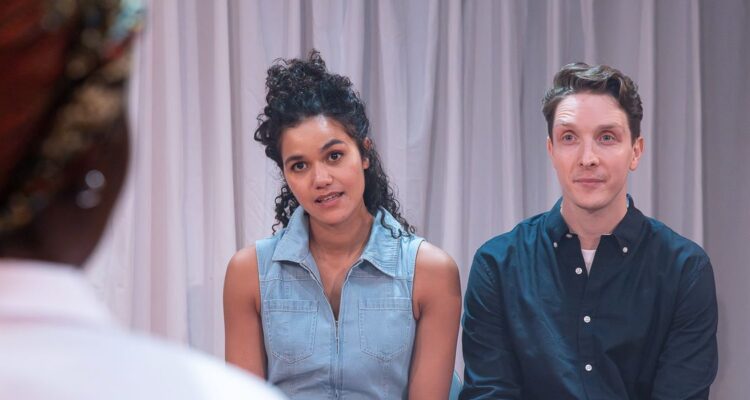Emma Hemingford’s new play poses two essential questions – if we could prolong human life more or less without limit, what would that look like? And how might we react to that possibility? As a fulfilment of an aspiration that writers have imagined since the ‘Epic of Gilgamesh’, or as dystopian nightmare that turned out to be quite the opposite of our expectations?
The play begins as a prosperous couple in their 30s debate the options with a medical adviser. Jay, a biotech entrepreneur is all for opting for the gene therapy that would indefinitely extend their lives, whereas Alice, a primary school teacher, has hesitations. Presiding over the discussion is Dr Lane, whose tart comments and sharp observations leaven the seriousness of the issues. This is a very promising start to the play – intellectually incisive, but also with compelling naturalistic dialogue – a good balance between ideas and plausible human framing.
However, after this strong beginning the energy of the play gradually dissipates and the main characters never quite develop as one might hope. What follows is a succession of very short scenes that are really too short and incidental a coverage of the ensuing decades. The author’s intention is clearly to map the increasing dissatisfaction of the couple as the markers of a traditional life – work, holidays, sex and romance and parenting – are gradually replaced by a gathering sense of ennui and perpetual postponement of action now that time no longer really matters as a governing framework for life. That message does come across, but in a muted and fragmented form, so that one does not really sense the development of the characters as real people, or come to care about them.
There is good supporting work from other characters who engage with the life of the main couple – Valerie Antwi plays both Dr Lane and her daughter, also an administrator of the programme. Neither mother nor daughter have the economic means to fix’ their age, remaining ‘lifers’ instead. This economic aspect of access to extended life is a theme that could have been developed much further in the interplay of characters rather than merely as an intellectual concept. Similarly under-developed are the contributions of the couple’s daugther Annie. She is depicted as a child with delightful unselfconscious ease by Emily Butler, but her adult self is sketched in too briefly in the writing, and comes over more as a bundle of attributes than as a fully developed character, despite forceful playing by Una Byrne.
The emotional and intellectual progressions of the main two protagonists are easier to trace in the pathway of Alice than Jay. I found it quite hard to follow the rationale behind his gradual disintegration in the later sections of the play, whereas her movement from fearful scepticism to dogmatic commitment to the goals of the programme seems more easily comprehensible. Both Emma Macdonald and Christopher York in these roles make the most of the opportunities presented to them, and have a good chemistry in projecting their intimacy and later estrangement.
The play is set in traverse, though I could not really see a compelling reason for this in terms of the action, and sometimes movement seemed awkward when furniture was added to the platform. I don’t often suggest that plays should be longer than they are, but in this case, given the scale of the issues, I wondered whether development into a full length play or film night suit the materials better, as for example in the film Gattaca, which came to mind while watching and reflecting on the themes of this piecc.
Writer: Emma Hemingford
Director: Frederick Wienand
Cast: Valerie Antwi, Emily Butler, Una Byrne, Emma McDonald, Christopher York
Until 19 October 2024
90 mins, no interval
Photo Credit: Charlie Lyne

